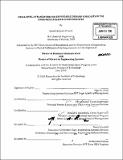| dc.contributor.advisor | Chris Caplice and Donald B. Rosenfield. | en_US |
| dc.contributor.author | Uriarte, Daniel Antonio | en_US |
| dc.contributor.other | Leaders for Global Operations Program. | en_US |
| dc.date.accessioned | 2010-10-12T17:58:11Z | |
| dc.date.available | 2010-10-12T17:58:11Z | |
| dc.date.copyright | 2010 | en_US |
| dc.date.issued | 2010 | en_US |
| dc.identifier.uri | http://hdl.handle.net/1721.1/59172 | |
| dc.description | Thesis (M.B.A.)--Massachusetts Institute of Technology, Sloan School of Management; and, (S.M.)--Massachusetts Institute of Technology, Engineering Systems Division; in conjunction with the Leaders for Global Operations Program at MIT, 2010. | en_US |
| dc.description | Cataloged from PDF version of thesis. | en_US |
| dc.description | Includes bibliographical references (p. 104-106). | en_US |
| dc.description.abstract | As a consumer packaged goods company, "Company X" manufactures products "make-to-stock"; therefore, having reliable demand forecasts is fundamental for successful planning and execution. Not isolated to "Company X" or to the CPG industry, current global economic conditions have forced companies to seek increased cash flows as a method for weathering this financially difficult period. As a result, many organizations are pursuing improvements in demand forecasting and planning methodologies as a precursor to inventory optimization and to further liquidity positions. This thesis attempts to improve forecasting and planning processes by developing a framework that focuses on four general components identified as key for success by experts and practitioners. In addition, this thesis explores these components while utilizing "Company X" as the case study for improvement. The four forecasting and planning components explored at "Company X" include Data Treatment, Forecast Models, Planning Process, and Organizational Behavior. In the Data Treatment section, we present implications of data aggregation in forecasting and planning activities, as well as provide a methodology to segment SKU's for prioritization during forecasting and planning. While in the Forecast Models section, we explore various forecasting models applied during different stages of the product lifecycle, and utilize these models under "least error" selection with sales data at different levels of aggregation to determine which combination results in the most accurate forecast. Moreover, in the Planning Process section, we explore the Sales and Operations Planning methodology, and provide a set of best practices to design a planning process that meets the requirements of "Company X". Lastly, in the Organizational Behavior section, we depict the "Company X's" planning process and organization, and highlight some of the behaviors typically observed during forecasting and planning activities. Although most of the proposed components provided forecasting and planning improvements over the legacy method, not all of these were implemented at "Company X". Nevertheless, the implemented improvements provided a forecast error reduction from 17% to 10% over the life of the project. However, these improvements were not equal for all SKU segments, as B segment SKU's, or medium criticality products, benefited the most from the execution of this project. | en_US |
| dc.description.statementofresponsibility | by Daniel Antonio Uriarte. | en_US |
| dc.format.extent | 106 p. | en_US |
| dc.language.iso | eng | en_US |
| dc.publisher | Massachusetts Institute of Technology | en_US |
| dc.rights | M.I.T. theses are protected by
copyright. They may be viewed from this source for any purpose, but
reproduction or distribution in any format is prohibited without written
permission. See provided URL for inquiries about permission. | en_US |
| dc.rights.uri | http://dspace.mit.edu/handle/1721.1/7582 | en_US |
| dc.subject | Sloan School of Management. | en_US |
| dc.subject | Engineering Systems Division. | en_US |
| dc.subject | Leaders for Global Operations Program. | en_US |
| dc.title | Developing a framework for dependable demand forecasts in the consumer packaged goods industry | en_US |
| dc.type | Thesis | en_US |
| dc.description.degree | S.M. | en_US |
| dc.description.degree | M.B.A. | en_US |
| dc.contributor.department | Leaders for Global Operations Program at MIT | en_US |
| dc.contributor.department | Massachusetts Institute of Technology. Engineering Systems Division | |
| dc.contributor.department | Sloan School of Management | |
| dc.identifier.oclc | 659780813 | en_US |
